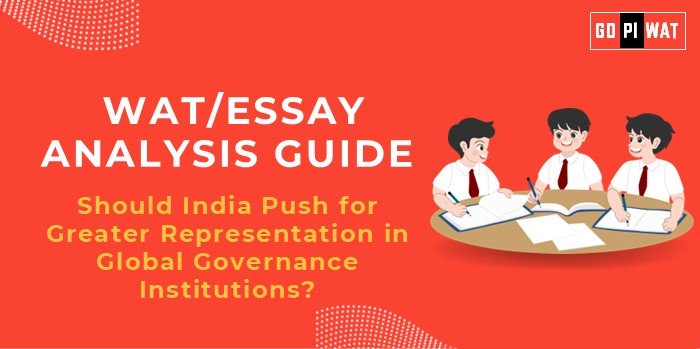📋 Written Ability Test (WAT) Analysis Guide
🌟 Should India Push for Greater Representation in Global Governance Institutions?
🌐 Understanding the Topic’s Importance
India’s demand for greater representation reflects the need to modernize global governance. This essay topic ties into themes of equity, geopolitics, and the role of emerging economies, making it a relevant discussion for B-school lessons on leadership, strategy, and international relations.
⏳ Effective Planning and Writing
- ⏱️ Time Allocation:
- Planning: 5 minutes
- Writing: 20 minutes
- Review: 5 minutes
- 📜 Preparation Tips:
- Identify key data, such as India’s IMF voting share (2.75%) and contributions to global governance.
- Understand the perspectives of stakeholders, including P5 nations, emerging economies, and global institutions.
💡 Introduction Techniques for Essays
- ⚖️ Contrast Approach: “India is the 5th largest economy but holds only 2.75% of IMF voting rights. This disparity underscores the urgent need for governance reform.”
- 🔧 Solution-Based: “Global challenges demand inclusive governance, making India’s representation pivotal for stability.”
📋 Structuring the Essay Body
- 🏆 Achievements:
- India’s significant contributions to UN peacekeeping missions enhance global stability.
- Leadership in global trade, as seen in its growing influence within the G20 and WTO.
- ⚠️ Challenges with Comparative Analysis:
- Resistance from P5 nations in the United Nations Security Council (UNSC).
- Comparisons with Germany and Japan, which also seek greater representation but face similar barriers.
- 🔮 Future Outlook:
- Advocate for quota reallocation in the IMF to reflect contemporary economic realities.
- Push for UNSC reforms, including expanding permanent membership to include India and other emerging powers.
✅ Concluding Effectively
- ⚖️ Balanced Perspective: “India’s inclusion would enhance legitimacy and efficiency, but reforms must ensure inclusivity for all emerging economies.”
- 🌍 Global Comparison: “Just as China’s IMF voting share reflects its economy, India’s representation must align with its global role.”
📊 Analyzing Successes and Shortcomings
- 🎯 Key Achievements:
- Strong economic growth and a strategic role in G20 diplomacy.
- Contributions to global stability through peacekeeping missions.
- ⚠️ Challenges:
- Resistance from dominant powers like the US and China in reforming global institutions.
- Limited influence within the current global governance framework.
- 🌍 Global Context: Comparisons with underrepresented economies like Brazil illustrate shared challenges and opportunities for reform.
📄 Recommendations for Sustainable Progress
- 🤝 Strengthen Alliances: Collaborate with BRICS and African nations to push for equitable reforms.
- ⚖️ Advocate for Phased Reforms: Gradually implement changes to avoid geopolitical tensions.
- 🌱 Enhance Strategic Engagement: Use platforms like G20 to showcase leadership and build consensus.
🖋️ Sample Short Essays
- ⚖️ Balanced Perspective: “India’s demographic and economic strengths make its inclusion in global governance essential for equitable decision-making.”
- 💡 Solution-Oriented: “To address global challenges, institutions must evolve to include emerging economies like India.”
- 🌍 Global Comparison: “As China’s global influence grows, India’s fair representation becomes vital for balanced governance.”


